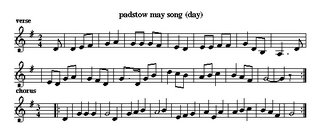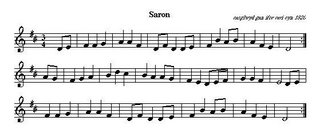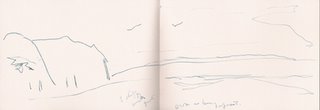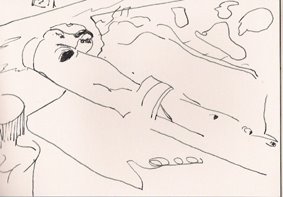gaeaf

X:3
T:caingc y cathreinwr
S:ifor ceri ms
A:morgannwg
M:C
L:1/4
Q:1/4=180
W:o blin yw damshel pigau dur
W:a blin yw cur y galon
W:ond blinach ydyw colli run
W:a hi ei hun yn foddlon
K:C
c/d/|eedB|ccc>B|ccBA|^GEzA/B/|
ccc>c|dde>d|cBcA|^GEA2|B2A2:|
ifor ceri, or john jenkins, collected many tunes mainly in mid, south and west wales. he was not the first, iolo morgannwg having collected some eighty or so tunes a generation before ifor.
i shan't translate, so as not do purge their melancholy sound.
it has rained for thirty days. today, walking between llangrannog and ynys lochtyn i observed three trees; sloe, rose and gorse, budding. the horizon was rimmed with salmon pink and the calm sea a leaden colour, like salmon skin. to the north, yr eifl were only just visible but to the southwest, the preseli mountains were, in turn, purple, transparent and gold. in the village a street of houses was empty except for one inhabited building. the person explained that all the owners lived away and came back only for the summer. it is raw economics.
mary jones, who i don't know, has an excellent resource here. on it is to be found the juvencus englynion, some of the oldest examples of welsh verse, transcribed in the ninth century, apparently - and suitably wintry
The Three Juvencus Englynion, pp. 48-50.
Niguorcosam nemheunaur
Henoid mitelu nit gurmaur
Mi amfranc dam ancalaur
Nicanu niguardam nicusam
Henoid cet iben med nouel
Mi amfranc dam anpatel
Namercit mi nep leguenid
Henoid is discyrr mi coueidid
Dou nam riceus unguetid
The W. F. Skene Translation, 1869?
I will not sleep tonight, not one hour
Tonight; my houshold is not great.
I and my Franc around our kettle.
I sing not, nor laugh, nor sleep,
Tonight; though drinking the new mead,
I and my Franc around our pot.
No joyousness impresses me,
Tonight; my song is a lament.
Two do not talk to me [with] one speaker.
The Ifor Williams translation, 1932
I shall not boast vain things to-night
My retinue is not very large,
I and my hireling, about our cauldron.
I shall not sing, I shall not laugh, I shall not talk to-night,
Though we drank clear mead,
I and my hireling, about our bowl.
Let no-one ask me for mirth tonight;
Mean is my company.
Two lords...
whilst on the subject of iolo, and one is never far from it a link from mary's page takes us to an etext of some of iolo's english language poetry, which i also copy below as pages can disappear. their pastoral joy is perhaps a little out of context in this post but the pills and the melancholy they purge are not always that different from each other
Iolo | Johan Schimanski | Universitetet i Trømsø | 27.06.99
Iolo Morganwg:
Poems, Lyric and Pastoral (1794)
The following e-text contains a short excerpt from vol.1 of Poems, Lyric and Pastoral (J. Nichols, London 1794) by Edward Williams (=Iolo Morganwg, 1747-1826). See also The "Lyric Pastoral": A Natural Genre?.
Much of the layout and typography has been left intact, but long s (s not followed by a space or by a punctuation mark), spaces before (the more complex) punctuation marks, and "follow-on" words printed in the bottom right corner of each page have been suppressed. Certain words within the text are set in capitals: their initial letters are generally slightly larger than the those in the rest of the word, and this does not show in this version.
Unfortunately, this text being entered manually from a fax of the original, some of the letters had to be guessed at; these are enclosed in
Typed in by Johan Schimanski on the second day of 1993 at the University of Oslo; these texts may be copied & disseminated freely throughout the ether.
Thanks to Richard Crowe & Andrew Hawke of the Geiriadur Prifysgol Cymru for providing the originals at such short notice.
<182:>
C O N T E N T,
A LYRIC PASTORAL.
1. NOW morning meets my gladden'd eyes,
From healthful sleep I jocund rise,
With strength renew'd, and placid mind,
To relish Nature's joys inclin'd,
I speed to meet the fragrant gale
That wantons in the dewy dale;
And, as I pace the
To sweet Content attune my lay.
<183:>
2. How clad with smiles the vernal morn!
How gay the bloom-bespangled thorn!
The lark is up, the welkin rings,
And with his flock the shepherd sings;
His notes a pleasing thrill impart;
They cheer my soul, and soothe my heart.
Oh! let my days like his be spent,
In rural shades with mild Content.
3. The Blackbird warbles on the bough,
The Milkmaid sings beneath her Cow;
The Mower, up with early dawn,
Prepares to fleece the clover'd lawn;
The Farmer views his blooming wheat*,
And starts the lev'ret from her seat;
* Blooming wheat.] The wheat's bloom is a beautiful, and ver
<184:>
Whilst I this lonely vale frequent,
To muse the praises of Content.
4. I verdant mead, and shady grove,
Dear simple scenes of nature, love,
And highly prize my happy lot,
That gave me one sequester'd cot,
Far from the bust
Far from the mansions of the Proud,
And gave, to crown the blest event,
The tranquil feelings of Content. 5. Pleas'd with my little flock of sheep,
That on my native downs I keep;
Mine are the joys of Peace and Health,
And sure I want no greater wealth;
No vain desires my soul infest,
Nor dwells Ambition in my breast.
Heav'n, all such follies to prevent,
Tam'd all my thoughts to soft Content.
<185:>
6. Oh! thou from whom all comfort flows,
Whose hand the richest boon bestows,
Whose careful Providence imparts,
The purest bliss to humble hearts;
Oh! let me never find content,
But in meek thoughts on virtue bent;
Whilst, of thy laws enamour'd still,
I bow submissive to thy will.
__________
<186:>
A S O N G.
1. WITH Phillis alone in the grove,
I pass'd the still ev'ning away;
My song was the tale of our love,
She smil'd, and approv'd the lay.
I felt the sweet glance from her eyes,
It open'd the way to her heart;
And Phillis could never disguise
Her looks with the varnish of Art. 2. The blush that appear'd on her face
Out-rival'd yon rose in the grove;
It spoke with ineffable grace
The wordless confession of Love;
Whilst Modesty brighten'd her charms,
And sweet looks her affection express'd,
I took the clear nymph in my arms,
And held her with joy to my breast.
<187:>
T H E P A R T I N G,
A LYRIC PASTORAL.
1. LIFE yields no joy devoid of care,
It is our doom awhile to part;
But whilst I go, my lovely fair,
I leave with thee my constant heart;
Thy Colin shall, in plaintive song,
The stories of our love rehearse;
And, as the moment glides along,
Thy name shall fill my tender verse.
<188:>
2. I'll sing the well-remember'd hour,
When first I felt thy peerless charms;
When first, within this privet bow'r,
Thy beauties fill'd my circling arms;
I'll sing the sweet sequestered walk,
Or seat beneath yon aged thorn;
Where oft we met for tender talk,
At ev'ning mild, or dewy morn. 3. Whilst far from Delia sadly thrown,
And by Misfortune rudely tost,
Pursu'd by Fate's malignant frown,
In all my soul's enjoyment cross'd
The wintry storm will fleet away;
I'll bear those ills a little while;
And keep in view that happy day,
When thou shalt meet me with a smile.
<189:>
4. Wilt thou, my Delia, keep my heart
Still faithful as the turtle dove?
And let no swain, with baleful art,
Induce thee to forget my love?
My soul to thee shall true remain,
Till Fate, in pity to my sighs,
Relenting kindly, shall again
Restore thee to my longing eyes. 5. Wilt thou frequent our fav'rite bow'r,
And wilt thou there in silence mourn,
Till time brings on the blissful hour,
That sees thy lover's wish'd return;
When Colin in its green alcove,
With Delia meets, no more to part;
Whilst, in that eye, the look of love,
Restores thee to my joyful heart?
<190:>
6. Whilst on this tender theme I muse,
It yields my soul a soft relief;
Hope brightens up its lovely views,
And charms away the glooms of grief.
Though Fate our envy'd bliss delays,
And dooms thy Colin far to rove;
Yet we shall end
United in the bands of love.
The Reader will observe, that the term Lyric Pastoral has been often used, and will, perhaps ask, for what reason?—It is this—We often observe Shepherds, and other rural characters, diverting themselves with songs, which are always, in the proper sense of the word, sung to a tune; the verse of course must be Lyric<.> SHENSTONE'S Pastoral Ballads are, for this reason, amongst others, far more natural than the Bucolics of Theocritus, Virgil, and many more that could be named; this at last is a<191:> Welsh Bard's opinion, who admits of no authority but that of NATURE. We often hear the fields resound with Chevy Chase, Tweed Side, and such popular songs. Shepherds, Ploughmen, and Goatherds, will often write verses to favourite tunes in praise of their Phillidas, their Annies, and their Delias. But we never meet with them spouting Heroics, "sub tegmine fagi." At least it is thus in every part of BRITAIN. But some, it seems, are of the opinion that we should write for other countries, climates, and times, rather than our own. Bravo! my good Critics!
__________
<147:>
P A S T O R A L.
In the Welsh Manner*.
1. AN arbour sequester'd I found,
Of hawthorn, with woodbines attir'd<;>
'Tis hid by green thickets around,
'Tis by my dear Phillis admir'd
I led her one day to the place,
From all observation apart;
And, urg'd with a lover's embrace,
I told her of my heart!
* There is nothing in the Welsh poetic taste, however def
<148:>
2. See, Phillis, the gladness of Love<,>
On ev'ry sweet object impress'd;
It softly distills from above,
To soothe our afflictions to rest;
Though saddest misfortunes arise,
Assuming each terrible form;
Love's willing attention supplies
A shield that can battle the storm.
3. Unblest are all those who decline
What Love, only Love, can bestow!
Nought else can our pleasures refine,
Nought else of true comfort we know;
'Twill brighten the gloom of our days,
'Twill keep our best feelings awake;
O! let us, avoiding delays,
Of Love's balmy raptures partake.
<149:>
<4.> Observe the gay thickets and
The skies that are fulgent above;
The fragrance we breathe in the gales;
All die with the season of Love!
For, all that is charming of Spring,
The Summer's high fervor will burn;
And, bearing the storm on it's wing,
Stern Winter will quickly return. 5. How sweet are the valleys of May!
Delicious the mornings of June!
We'll prize them, be jocund and gay,
To joy the new carol attune;
The birds have a musical strain!
How fragrant the beautiful rose!
But, seeking, we seek them in vain,
When woodlands are cover'd with snows.
<150:>
6. Our moments incessantly waste,
Soon vanish unheeded away;
Youth flies on the pinions of haste,
Nor listens to mortal delay;
Then let us, my Phillis, improve
Our time that is dwindling apace,
And, yielding to Nature and Love,
The joy that's allow'd us embrace!
and follows a return to wintery coldness in a song, originally noted by iolo, rendered in my dialect
fi wn lle ma gwitw tu wnt i gyrdydd
lle gallwn ga'l decpunt i ala bob dydd
a finne duw'm elpo mor wan ac mor wa'l
yn caru merch ifanc heb ddim iddi'i ga'l
here is an old tune pricked down by iolo morgannwg. it is not related to the verse. i am indebted to daniel huws of penrhyncoch who lent me his copy of the original. the barring is as pricked by iolo

X:1
T:cywydd deuair "morgannwg"
O:LLGC Llsgrau Iolo Aneurin Williams heb eu catalogio
N:priciad Iolo Morgannwg (Edward Williams)
M:C
L:1/4
K:C
ABcAGABEABcABcAA|
EEE>FEDEA|FFG>FEDEA|cABEB>cBA||



























